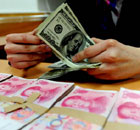Economy
Sudden yuan change poses risks
By Zhou Yan (China Daily)
Updated: 2010-04-09 09:08
 |
Large Medium Small |
SHANGHAI - An abrupt and bold step to raise the value of the Chinese currency will not benefit China, the United States or the global economy, but may increase inflation risks in Asia, Xia Bin, a newly appointed member of the central bank's Monetary Policy Committee, said on Thursday.
"China's current exchange rate helps it recover at a rapid and sustainable level, which in turn has largely contributed to the recovery of the global economy," Xia said at Halter Financial Summit in Shanghai on Thursday.
A quick appreciation of the yuan would do little to solve the large trade deficit and high unemployment rate in the US, he said, adding that the cooling of Chinese economy from a rising rate would hamper the global recovery and consumers in the US due to climbing costs for goods.
| ||||
According to Xia, China's effective exchange rate cumulatively jumped by 14.5 percent from September 2008 to February 2009, indicating that the yuan is not very undervalued in such economic conditions.
But he said that China should resume the "managed floating exchange rate" in the short-term given the large size of its economy.
China abolished the yuan's peg to the US dollar in July 2005, linking the rate to a basket of currencies, but repegged it to the greenback in July 2008 during the global financial crisis.
"It's completely unrealistic for China at this stage to have a fully flexible exchange rate," Pieter Bottelier, economist and former chief of the World Bank's Resident Mission in China, said.













